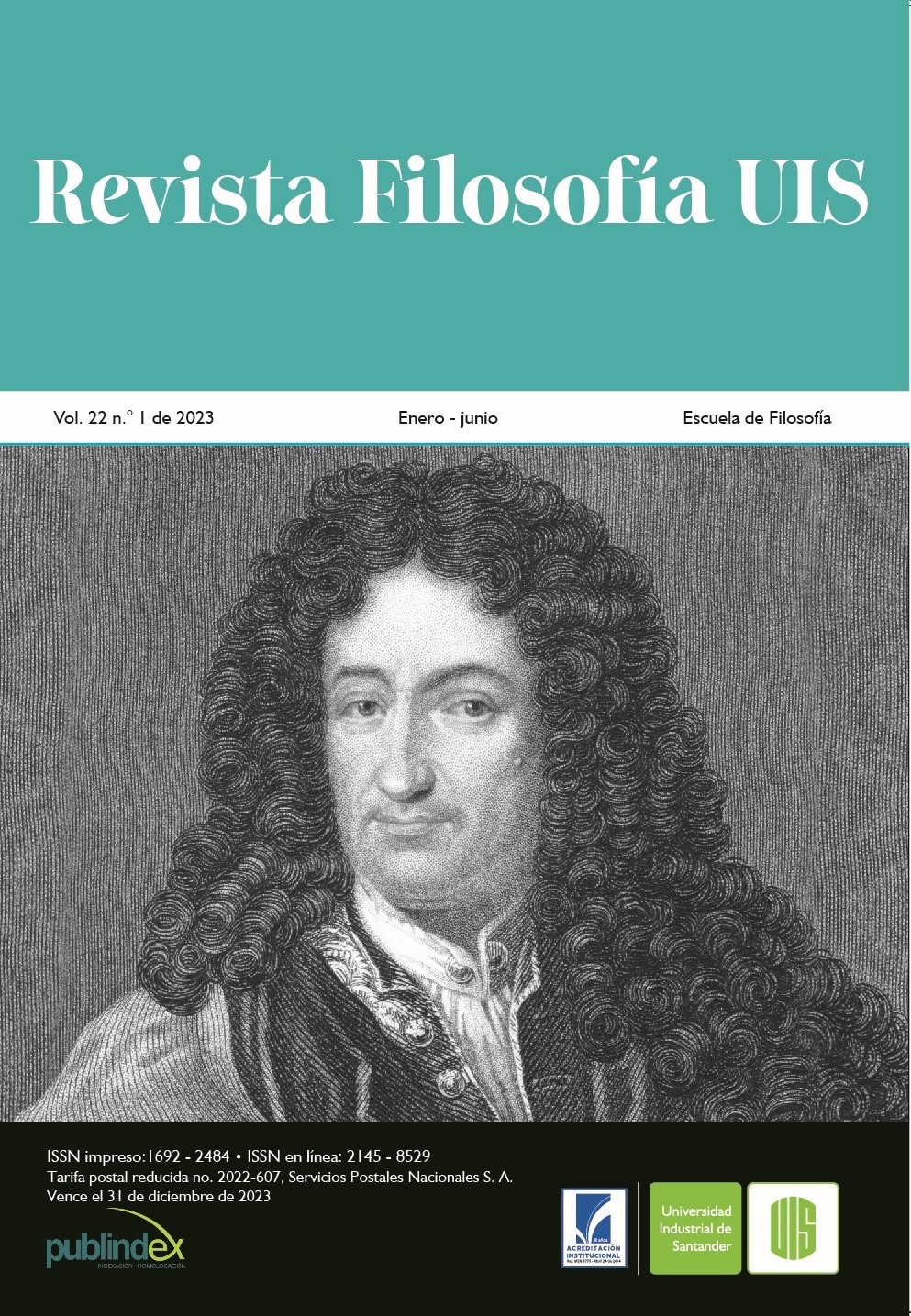Inquiring About the Human Condition in Times of War: The Heidegger-Cassirer Debate in Davos and its Reception on Blumenberg
Published 2023-01-02
Keywords
- Blumenberg,
- Heidegger,
- Cassirer,
- Philosophical anthropology,
- philosophical anecdote
How to Cite
Copyright (c) 2023 Revista Filosofía UIS

This work is licensed under a Creative Commons Attribution 4.0 International License.
Abstract
This article aims to understand the Davos disputations between Martin Heidegger and Ernst Cassirer as a fundamental anecdote in the XX century for a philosophical anthropology. The principal reason is that the Davos disputations allows theatrical performance of the most important questions that must be answered on the way to a philosophy about the human condition. Specifically: the method, the place of the anthropology in the philosophical canon and, the possibilities to introduce the historical, contingent and symbolic aspects in the fourth Kantian question. Finally, this article aims that the philosophy of H. Blumenberg allows finding a way of communication between Heidegger and Cassirer and therefore a renewal of the philosophical question by the human condition.
Downloads
References
- Adams, D. (1991). Metaphors for Mankind: The Development of Hans Blumenberg’s Anthropological Metaphorology. Journal of the
- History of Ideas, 52(1), 152-166. https://doi.org/10.2307/2709587
- Altman, W. (2012). Martin Heidegger and the First World War. Being and Time as Funeral Oration. Lexington Books.
- Blumenberg, H. (1985). Work on Myth (R. M. Wallace, Trad.). MIT Press.
- Blumenberg, H. (1986). Arbeit am Mythos. Editorial Suhrkamp.
- Blumenberg, H. (1999). Las realidades en que vivimos (P. Madrigal, y I. D. Bozal, trads.). Editorial Paidós.
- Blumenberg, H. (2002). La posibilidad de comprenderse (C. González, trad.). Síntesis.
- Blumenberg, H. (2003). Trabajo sobre el mito (P. Madrigal, trad.). Editorial Paidós.
- Blumenberg, H. (2010). Descripción del ser humano (G. M. Schoor, trad.). Fondo de cultura económica.
- Blumenberg, H. (2016). Fuentes, corrientes, icebergs. Fondo de Cultura Económica.
- Cassirer, E. (1944). An Essay on Man. An Introduction to a Philosophy of Human Culture. Doubleday & Company, Inc.
- Cassirer, E. (1957). Kant y el problema de la metafísica (E. Garzón, trad.). Revista Humanitas, 3(8), 105-129.
- Cassirer, E. (1968). El mito del Estado. Fondo de Cultura Económica.
- Cassirer, E. (1976). Filosofía de las formas simbólicas, 3. Fenomenología del reconocimiento (A. Morones, trad.). Fondo de Cultura Económica.
- Cassirer, E. (1998). Filosofía de las formas simbólicas, 2. El pensamiento mítico (A. Morones, trad.). Fondo de Cultura Económica.
- Cassirer, E. y Heidegger, M. (1997). Davos Disputation between Ernst Cassirer and Martin Heidegger. En Heidegger, Kant and the Problem of Metaphysics (R. Taft, trad.) (pp. 193-207). Indiana University Press.
- Durán-Guerra, L. (2010). Metáfora y mundo de la vida en Hans Blumenberg. Revista de filosofía, 35(2), 105-127. https://revistas.ucm.es/index.php/RESF/article/view/RESF1010220105A
- Feron, O. (2018). Kant and Modernity between Gnosticism and Radical Enlightenment: the Davos Debate between Cassirer and Heidegger. En J. Miranda Justo, P. A. Lima y F. M. F. Silva (Eds.), From Heidegger to Badiou (pp. 17-28). Center for Philosophy at The University of Lisbon.
- Fragio, A. (2013). Destrucción, cosmos, metáfora. Ensayos sobre Hans Blumenberg. Lampi di Stampa.
- Friedman, M. (2000). A Parting of the Ways: Carnap, Cassirer and Heidegger. Open Court.
- García, P. E. (2002). ¿Ontología fundamental o teoría del conocimiento? Heidegger crítico del Neokantismo. Signos Filosóficos, 7, 125-150.
- Gordon, P. E. (2004). Continental Divide: Ernst Cassirer and Martin Heidegger at Davos, 1929: an allegory of intellectual history. Modern Intellectual History, 1(2), 219-248. https://doi.org/10.1017/S1479244304000137
- Heidegger, M. (1997). Kant and the Problem of Metaphysics (R. Taft, trad.). Indiana University Press.
- Heidegger, M. (2020). Ser y tiempo (J. E. Rivera, trad.). Ediciones Trotta.
- Pavesich, V. (2008). Hans Blumenberg's Philosophical Anthropology: After Heidegger. Journal of the History of Philosophy, 46(3), 421-448. https://doi.org/10.1353/hph.0.0031
- Pavesich, V. (2013). Hans Blumenberg: An Anthropological Key [Tesis doctoral en Filosofía, University of California]. https://www.elibrary.ru/item.asp?id=6714376
- Villacañas, J. L. (2015). Por qué los momentos decisivos nunca lo parecen. Informe de un episodio del siglo XX (Manuscrito no publicado). Universidad de Murcia.
- Waite, G. (1998). On Esotericism: Heidegger and/or Cassirer at Davos. Political Theory, 26(5), 603-651. https://doi.org/10.1177/0090591798026005001
